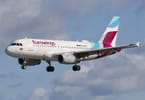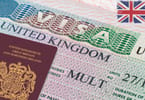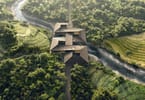“The heat of the night suddenly gave way, when after due warning by oncoming lightning and rolling thunder, the skies opened and a massive rainstorm swept over the lodge. Tree branches were scraping on the roof, beating it together with the rain to make up quite a drum beat, sounds only heard in the deep of Africa. Hippos were snorting away in the river below, much of the night, just meters away from my cabin at the Nile Safari Lodge, leaving no doubt who the residents and who the visitors were. At one stage during the second night, was the snorting replaced with much angrier sounds, as the hippos got into a mighty argument with some intruders, before, after chasing them off their patch, regular snorts resumed.”
The park presented itself dry with dust trailing every vehicle. There was evidence of recent controlled fires but fresh green was already sprouting from the ground and new foliage grew in the trees, allowing for game to be seen with greater ease – Uganda kobs, warthogs, buffalo, plenty of baboons along the way and when reaching the river suddenly elephants made an appearance, across the water and on two of the Nile’s marshy islands. At GeoLodges Nile Safari Lodge’s main viewing deck, monkeys were racing above me through the fig trees, with intervals of feeding on the new fruits and then again chasing each other, and birdsong filled the air, as the engines of the tourist boats strained against the river’s current to bring their passengers back from the Nile delta at Lake Albert to the Paraa landing site.
I had actually never seen that many boats coming upriver from the delta but later on learned that a good number of them belonged to the oil companies, some of which were carrying out surveys along the lake shores while at least one other was pointed out to me by Davidson, the lodge manager, as undertaking bird counts in conjunction with Nature Uganda, aimed to bring the bird inventory of the park up to date. And, of course, some boats came back from fishing for Nile Perch or other fish, with the required licenses available from the Uganda Wildlife Authority offices at the main ferry crossing. Keen anglers will of course bring their own rods but those who did not can, against a nominal fee, hire equipment from the boat operators and the guides will take their charges to the best fishing grounds available, both up river under the main falls as well as down river at the delta. One of the best bets, from information sourced while in the park, was given as Wild Frontiers’ fishing boats though others surely also have their merits.
On return from the game drives or boat excursions do the staff at the lodge enquire at what time guests prefer to have their shower and then appear with basins full of steaming water to fill the bucket shower, which is outdoor from the cabins’ bathrooms but of course walled in to give that intriguing feeling of standing in the open and yet remain hidden from any prying eyes.
In the evening, the MUBACO Group of Performers often surprises guests around the campfire with their songs and dance performances before dinner is served, always with a choice of three main courses, a soup as a starter and a dessert – though the chef, as witnessed, is happy to whistle up a special dish, given a bit of advance notice, to please the palate of his guests.
River safaris are one of Murchisons’ main attractions for tourists and besides the boats operated by the Uganda Wildlife Authority are private concessions now in place which offer a wider choice and most important, have created the capacity for the growing visitor numbers. Where the Nile enters Lake Albert plenty of small islands or floating reed are home to a rich birdlife, hippos are ever present and the guides watch them and their movement with hawk eyes of course, while on the shores game is seen coming to drink their fill of water but carefully observing the gauntlet of the huge Nile crocodiles which lay in wait to bring down an inexperienced young kob or even a buffalo as seen before. With over 450 species of birds recorded, including the ancient looking Shoebill stork, besides 76 mammal species, the park is a haven for birdwatchers as well as “regular” safari aficionados with plenty to discover among the flora of the park, too.
Murchisons’ Falls is Uganda’s largest national park, bisected by the Nile, which falls are a spectacular sight from both above from the viewpoint and from below while on the boats, but are most definitely best seen from the air, the plane sharply banking and thus allowing for a look straight down as the water shoots over the cliff and falls nearly 50 meters into the rock pool below. I am often asked how these falls compare to say Victoria Falls or Iguassu and I can only repeat that they don’t compare. Those falls are tall and wide while the special feature of the Nile falls at Murchisons’ is that the entire river squeezes through a gap just 7 meters wide, though seismic activity some decades ago did open up a little ‘side show’ which however has not taken anything from the spectacular view visitors can enjoy, when they take their pictures from the bouncing boats and launches which approach the falls twice a day. The Uganda Wildlife Authority has recently coined a new phrase for the falls, calling them “The World’s Most Powerful Waterfall” and certainly for a good reason, as a close up look reveals. These are the highest falls of the Victoria Nile, which, when reaching Lake Albert is then renamed into the Albert Nile as it swells in volume fed by the lake waters. As the river reaches the border with South Sudan at Nimule, it gets yet another name again, Bahr el Jebel or the White Nile, which eventually meets its namesake, the Blue Nile in Khartoum where the two branches merge to form what then remains The Nile.
But back to Murchisons Falls National Park no matter how interesting the geographical journey of the Nile would be to describe, through the Sudd in South Sudan, over the cataracts in Khartoum Sudan to Abu Simbel and the Valley of the Kings before finally, after passing through Cairo and along the Sphinx and the Pyramids, enters the Mediterranean Sea near Alexandria.
Murchisons, one of Uganda’s ten national parks and the largest of them all is also the most visited park in Uganda. It is home to a rich birdlife, including a number of endemic species, as well as to mammals and reptiles, the best known of which are the giant Nile crocodiles of course. Large numbers of elephant roam the park, herds of buffalo are frequently seen and giraffes strut their stuff as they crisscross the park in search of pasture. Lions are regularly spotted, leopards, while present, not so often as the elusive cats normally do their thing at night when visitors are confined to their lodges as UWA’s regulations do not allow for night game drives, perhaps a policy they ought to review as in many game reserves and private conservancies night safaris have become a big crowd puller and offer sights of animals otherwise not seen. Oribis, small gazelles, share the grazing grounds with the Uganda kobs and hyenas and jackals are constantly roaming their territory in search of food, scavengers as they are though they hunt too of course and take down what is too weak to escape them. Chimpanzee tracking is also a regular feature in the park, an added attraction if not a bonus for visitors who can come face to face with mankind’s closest relative in the wild.
One of the main upsides of a visit to Murchisons is the sheer size of the park where, even when the lodges are full, there never appears to be a crowd around a pride of lions. The variety of flora and fauna and the ability to do both game drives and boat excursions, not a regular feature in most other national parks across the region, too speaks for a visit, plus ease of access of course and the opportunity to visit the Ziwa Rhino Sanctuary en route, the only place in Uganda where rhinos can be seen in the wild. Several lodges and rest camps are available
There are downsides too though. A number of roads or tracks branching off show “No Entry” signs, reportedly leading to the test wells the oil companies have sunk in the past to establish how viable production would be. Those well maintained tracks would make a good addition for the game drive circuits but clearly are off limits instead of sharing this resource with the visitors to the park.
Questions asked but never quite fully answered go to the extent of production wells, and word from the grapevine has it there will be many dozens, very likely linked by a network of pipelines, all concentrated in the lower part of the park towards and along the shores of Lake Albert. Tour companies, and repeat tourist visitors as well as environmental and conservation journalists, would all like to know if there will be no go areas in the Nile delta, presently regularly frequented by tour vehicles on game drives for the regular sightings of game, which could curtail the available park area for tourism. It is hoped that the oil companies will be coming up with honest answers and not throw up smokescreens, as Ugandans have notoriously long memories and will not forget being misled.
Sections of the main road into the park now have assumed a regular washboard appearance, making driving far from pleasant, and the roadside seems to be used as a litter bin by far too many, as empty plastic water bottles line the way from the park gate to the river crossing at Paraa.
The boats of the oil companies also appear to be immune or exempted against any speed limit on the river, twice in fact seen racing each other up the river when coming from the lake and during the night we had no rain, just as I wanted to retire before the generator at the lodge was switched off, voices from the river made me go on the balcony only to see in the pale light of the moon some canoes paddling upstream, probably fish poachers using the cover of darkness to go about their illegal business. None of these issues are unsolvable and it is hoped that those downsides will make way to more upsides for the growing stream of local, regional and international visitors.
Flying to Murchisons’ Falls National Park, Uganda’s largest, makes a trip easy, be it from Entebbe or from Kajjansi, and landing at any of the three main airstrips, the centrally located CAA owned and operated Pakuba field, or the Bugungu airstrip on the Southern river bank, or the airstrip at the Chobe Safari Lodge in the wooded part of the park above the falls, allows one to step down from the plane within the hour after leaving Kampala (add driving time to Kajjansi or Entebbe to that of course).
Driving in contrast, from Kampala to the ferry crossing at Paraa, at easy speeds and taking a pit stop in Masindi into account, takes approximately 6 hours and then another 30 minutes to reach the Nile Safari Lodge (take the second turnoff for a shorter access route) which is located down river just outside the park, set right at the banks with an extraordinarily scenic view towards the Nile delta and across the papyrus islands to the opposite river bank. It can get hot in the park, on one day the thermometer touched 40 degrees C, so appropriate cotton wear is recommended as are anti-mosquito sprays essential to keep the bugs away. For more details on the park visit the Uganda Wildlife Authority website via www.ugandawildlife.org
WHAT TO TAKE AWAY FROM THIS ARTICLE:
- On return from the game drives or boat excursions do the staff at the lodge enquire at what time guests prefer to have their shower and then appear with basins full of steaming water to fill the bucket shower, which is outdoor from the cabins' bathrooms but of course walled in to give that intriguing feeling of standing in the open and yet remain hidden from any prying eyes.
- In the evening, the MUBACO Group of Performers often surprises guests around the campfire with their songs and dance performances before dinner is served, always with a choice of three main courses, a soup as a starter and a dessert – though the chef, as witnessed, is happy to whistle up a special dish, given a bit of advance notice, to please the palate of his guests.
- I had actually never seen that many boats coming upriver from the delta but later on learned that a good number of them belonged to the oil companies, some of which were carrying out surveys along the lake shores while at least one other was pointed out to me by Davidson, the lodge manager, as undertaking bird counts in conjunction with Nature Uganda, aimed to bring the bird inventory of the park up to date.






















